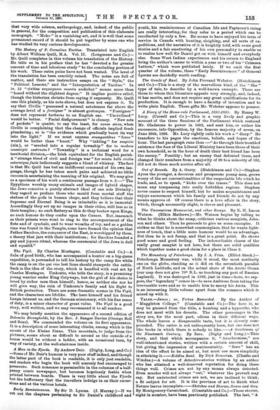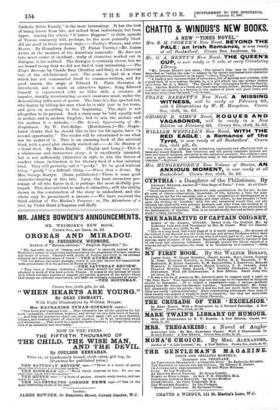TALES. —James ; or, Virtue Rewarded. By the Author of " Muggleton
College." (Constable and Co.)—The hero is, as may be guessed from the title, a humbug and a hypocrite, who does not meet with his deserts. The other personages in the story are, for the most part, odious in their different ways. The whole leaves a disagreeable taste, but it is cleverly com- pounded. The satire is not unfrequently keen, but one does not like books in which there is nobody to like.—A Gentleman of the Nineteenth Century. By Zero. (Digby and Long.) —This story, and that which accompanies it, "Anachronism," are well-intentioned stories, written with a certain amount of skill, but giving the impression of sentimentality. " Zero " has an idea of the effect to be aimed at, but must use more simplicity in attaining it—Riddles Read. By Dick Donovan. (Chatto and Windus.)—A volume of detective-stories written by an author who has attained a well-deserved reputation for doing these things well. Crimes are not by any means always detected. Even murder will not always "out," whatever the proverb may say. But undetected crimes are not, we are inclined to think, a fit subject for art. It is the province of art to finish what Nature leaves incomplete.—Sketches and Stories, Grave and Gay. By Montgomery Carmichael. (Constable and Co.)—These stories, eight in number, have been previously published. The last, "A Catholic Noble Family," is the most interesting. It has the look of being drawn from life, not indeed from individuals, but from types. Among the others, " L'Amico Beppino" (a little episode of Tuscan manners) will, perhaps, be the most generally liked. All are good in their several ways.—Paddy's Woman, and other Stories. By Humphrey James. (T. Fisher Unwin.)—Mr. James writes in the manner of his American namesake. He does not take much count of incident; study of character, worked out in dialogue, is his method. The dialogue is certainly clever, but we are bound to say that we did not find it very interesting.—The King's Revenge, by Claude Bray (Bentley and Son), is a historical tale of the old-fashioned sort. The scene is laid at a time which has not commended itself to romance-writers, and for good reason, the reign of Edward II. Piers Gaveston is introduced, and is made an attractive figure ; King Edward himself is represented with no little skill, a creature of impulse, steadily deteriorating, as such creatures must, under the demoralising influences of power. The hero is a fine spirited lad, who begins by killing his man when he is only just in his teens, and goes on according to this beginning. The style is not altogether to be praised. Such a story may be told equally well in archaic and in modern English; but to mix the archaic and the modern is a mistake.—The Second Opportunity of Mr. Staplehurst. By W. Pett-Ridge. (Hutchinson.)—Mr. Staple- hurst thinks that he should like to live his life again, have "a second opportunity." The reader will be entertained to see what use he makes of it. This is an amusing book of the satirical kind, with a good plot cleverly worked out.—As the Shadow of a Great Rock. By Maria English. (Digby and Long.)—This is a wholesome and instructive story; it is excellently intended, but is not sufficiently attractive in style to win the favour of readers whose inclination is for literary food of a less salutary kind. They will probably call it "goody." To be good without being " goody " is a difficult thing.— Worse than a Crime. By Mrs. George Martyn. (Same publishers.)—There is some good character-drawing in this tale. Lucy, the least attractive per- sonage of all who figure in it, is perhaps the most skilfully por- trayed. This does not tend to make it attractive; still the ability shown in the construction of the story is undoubted, and the whole may be pronounced a success.—We have received the third edition of The Maiden's Progress ; or, The Adventures of a Girl, by Violet Hunt (Chapman and Hall).



















































 Previous page
Previous page